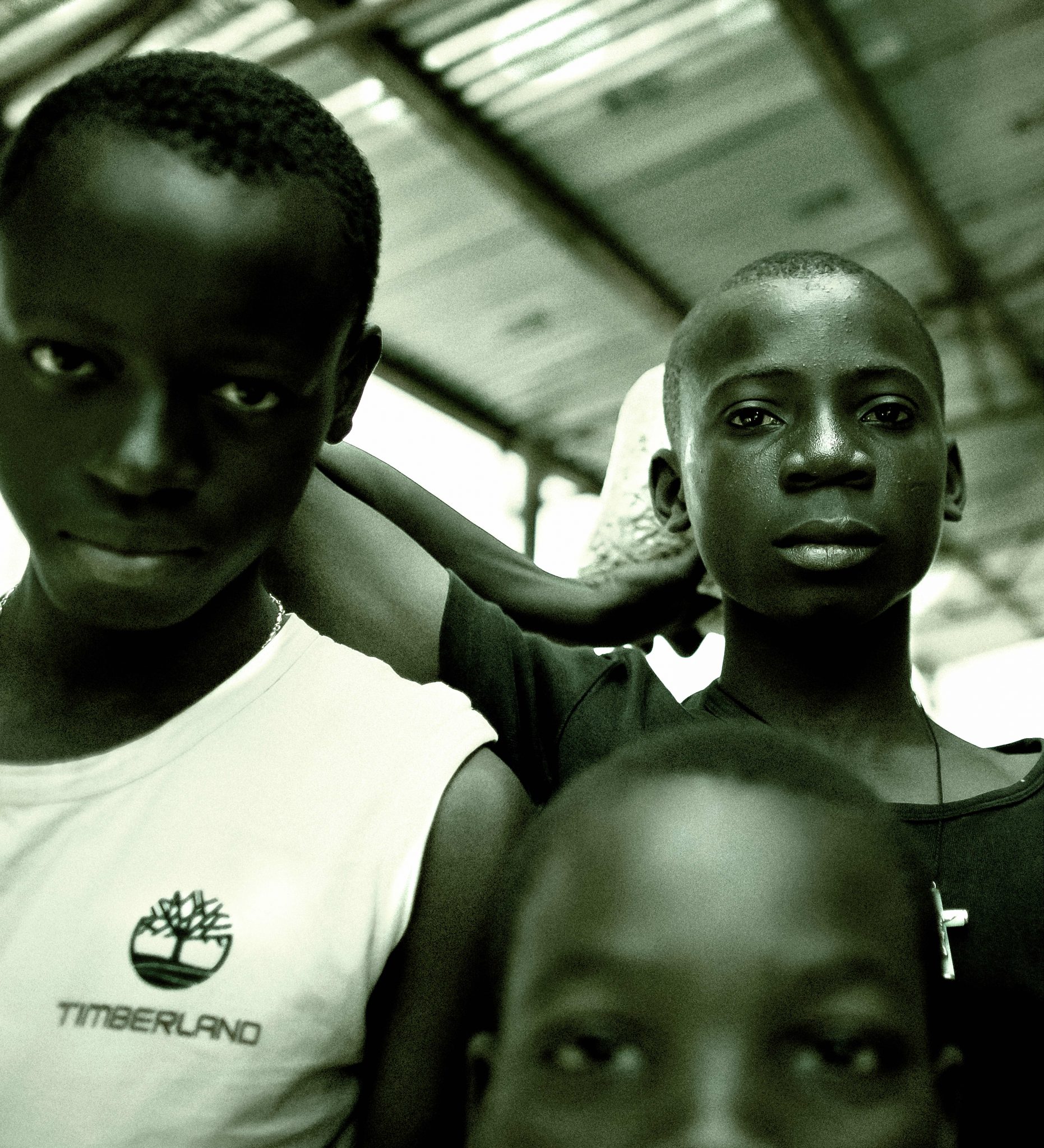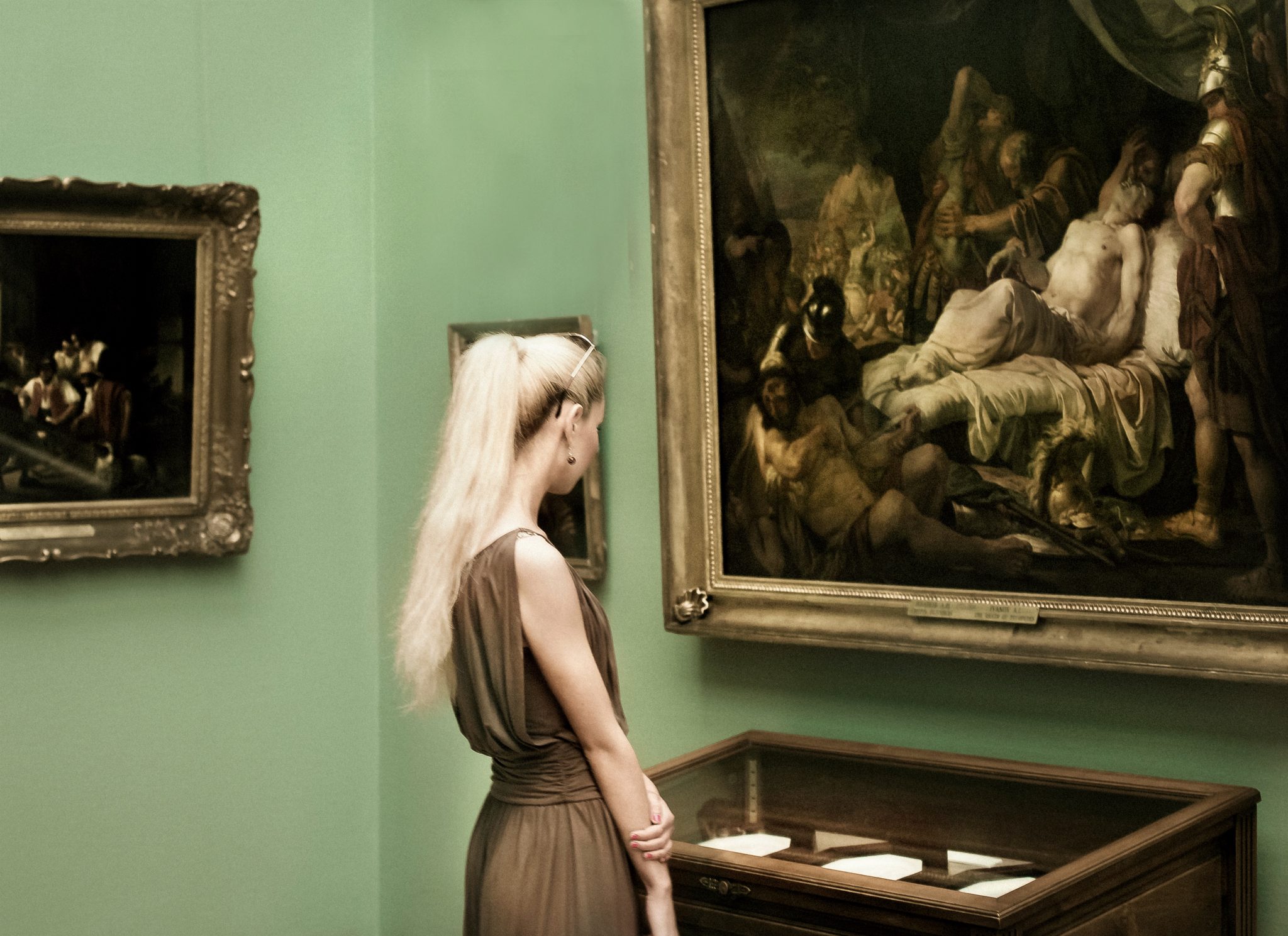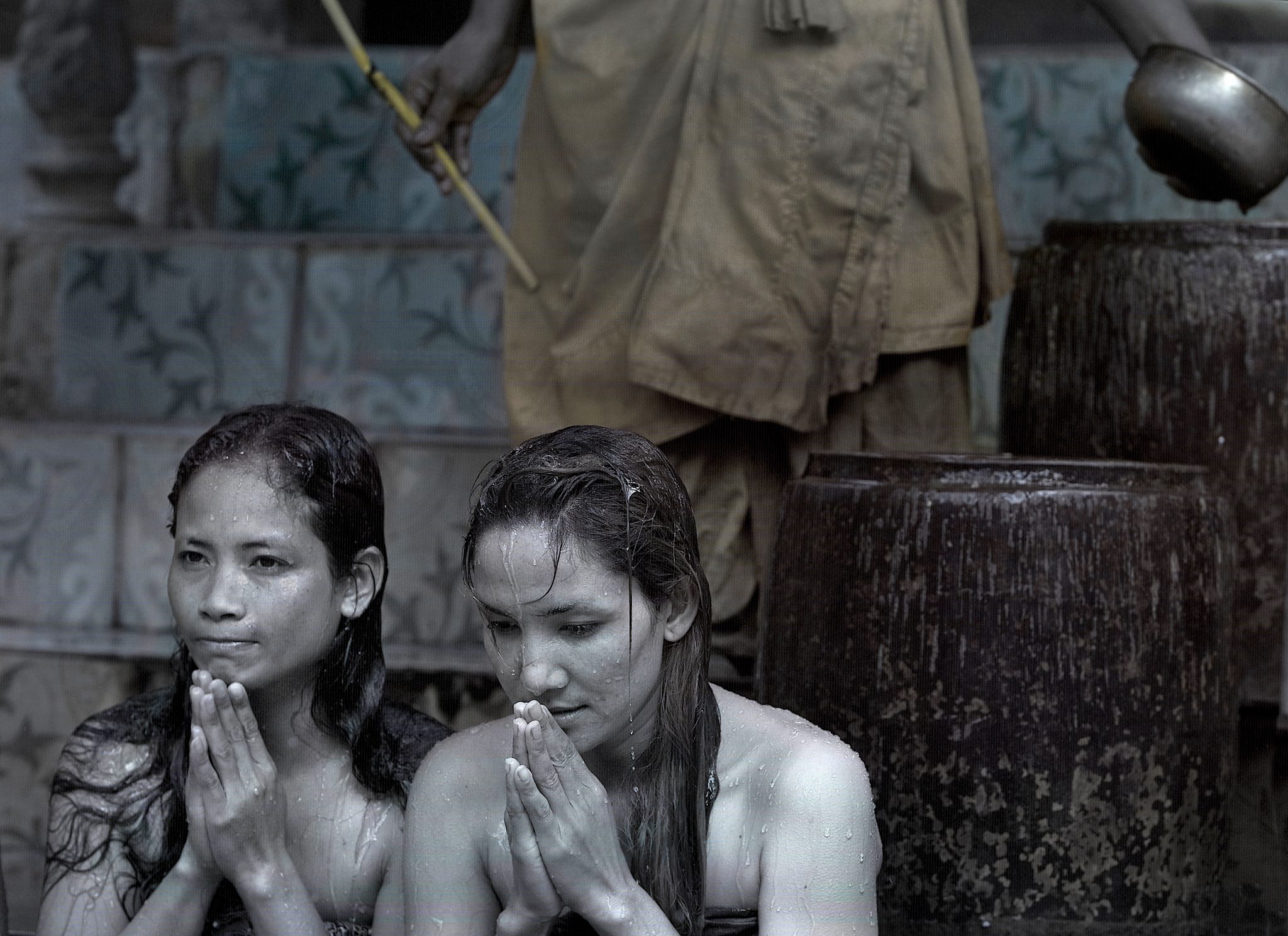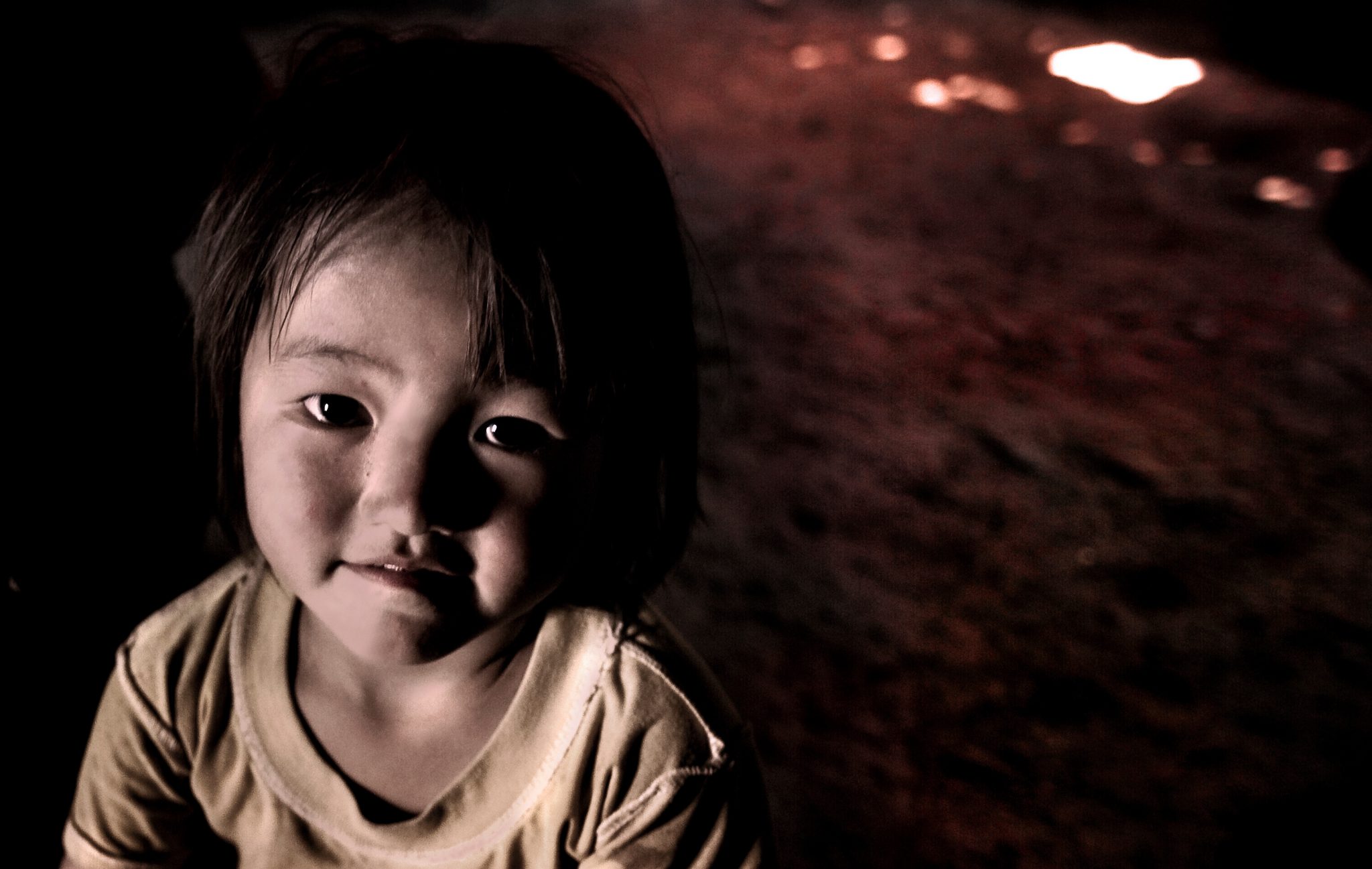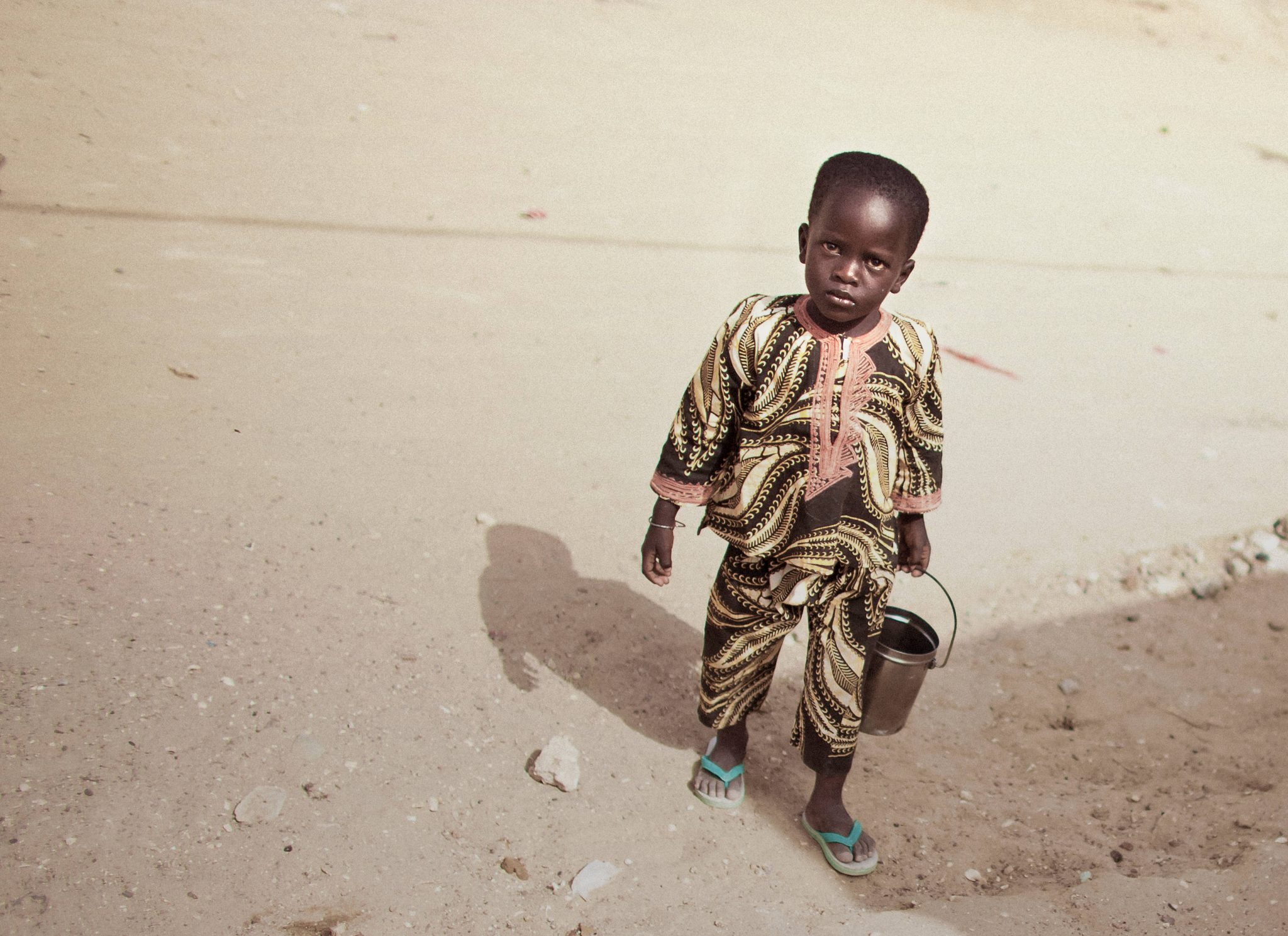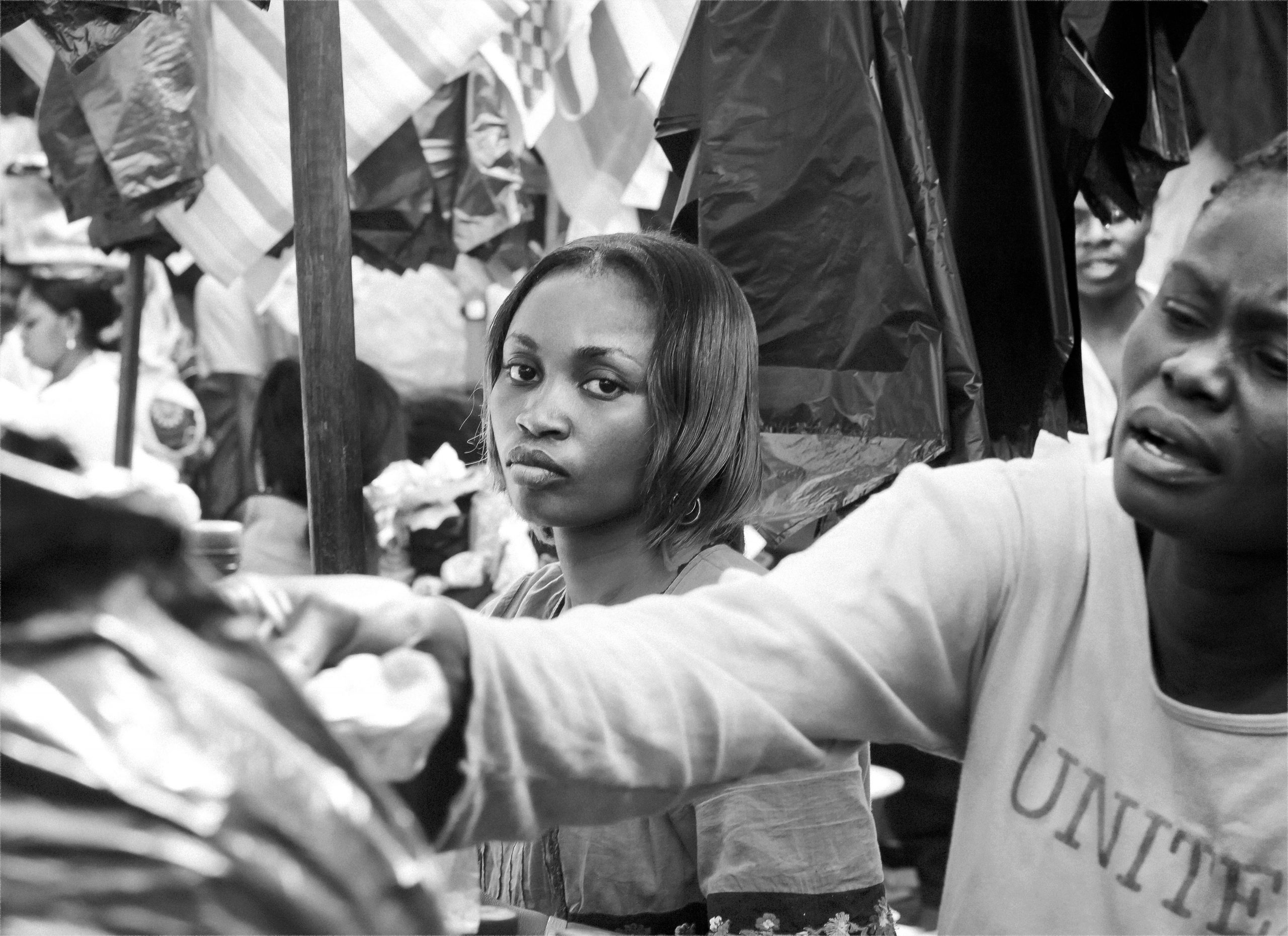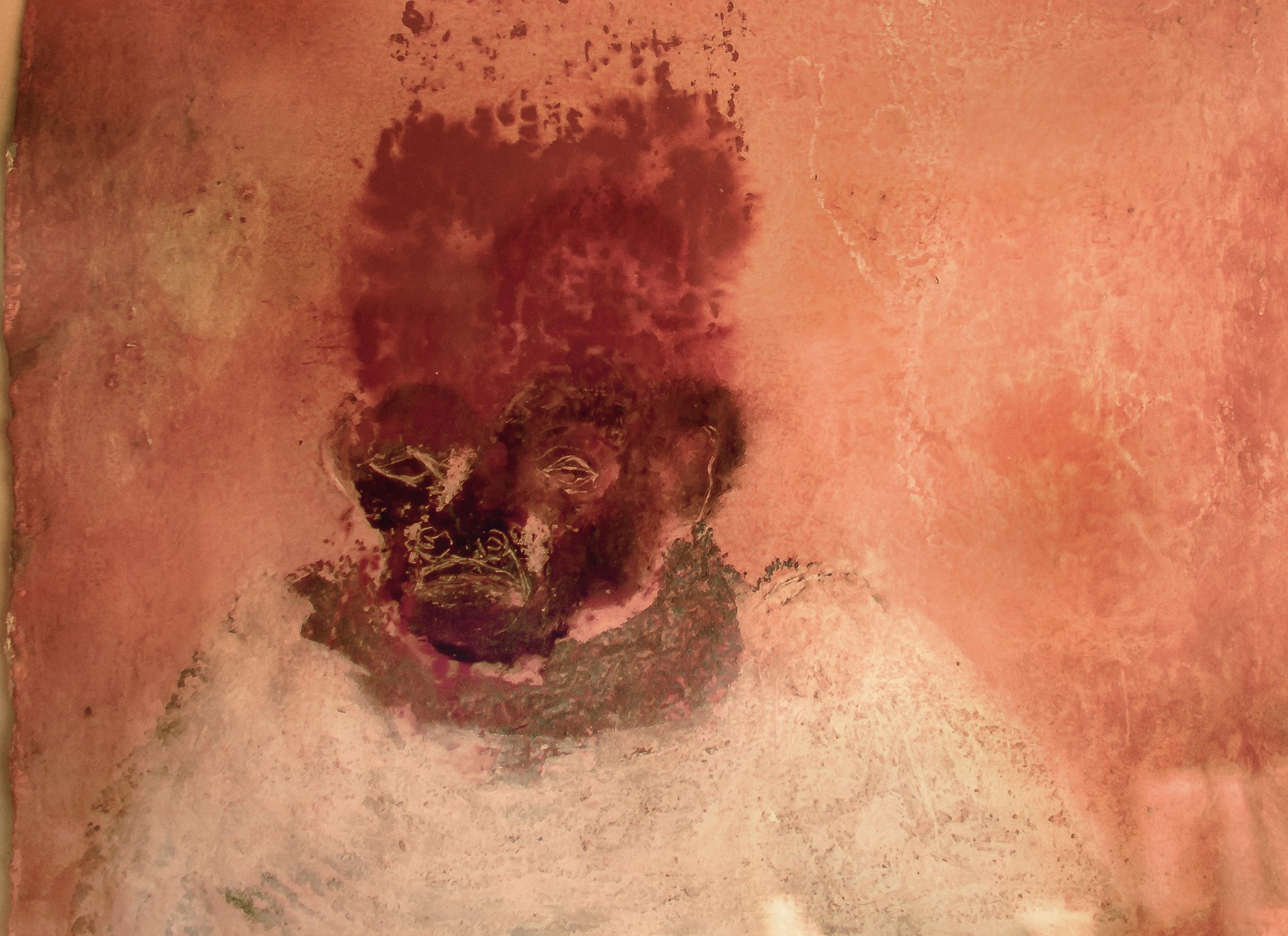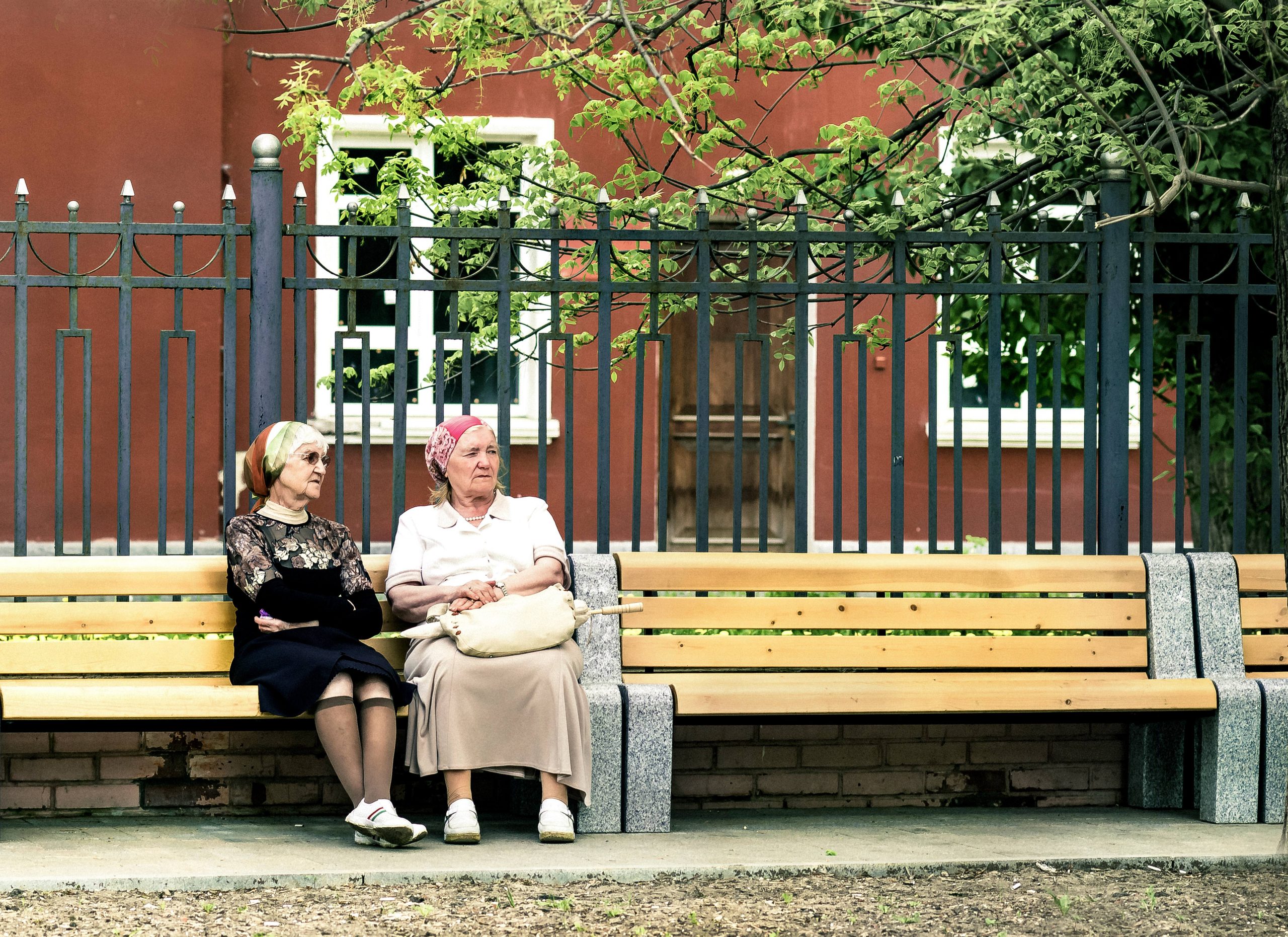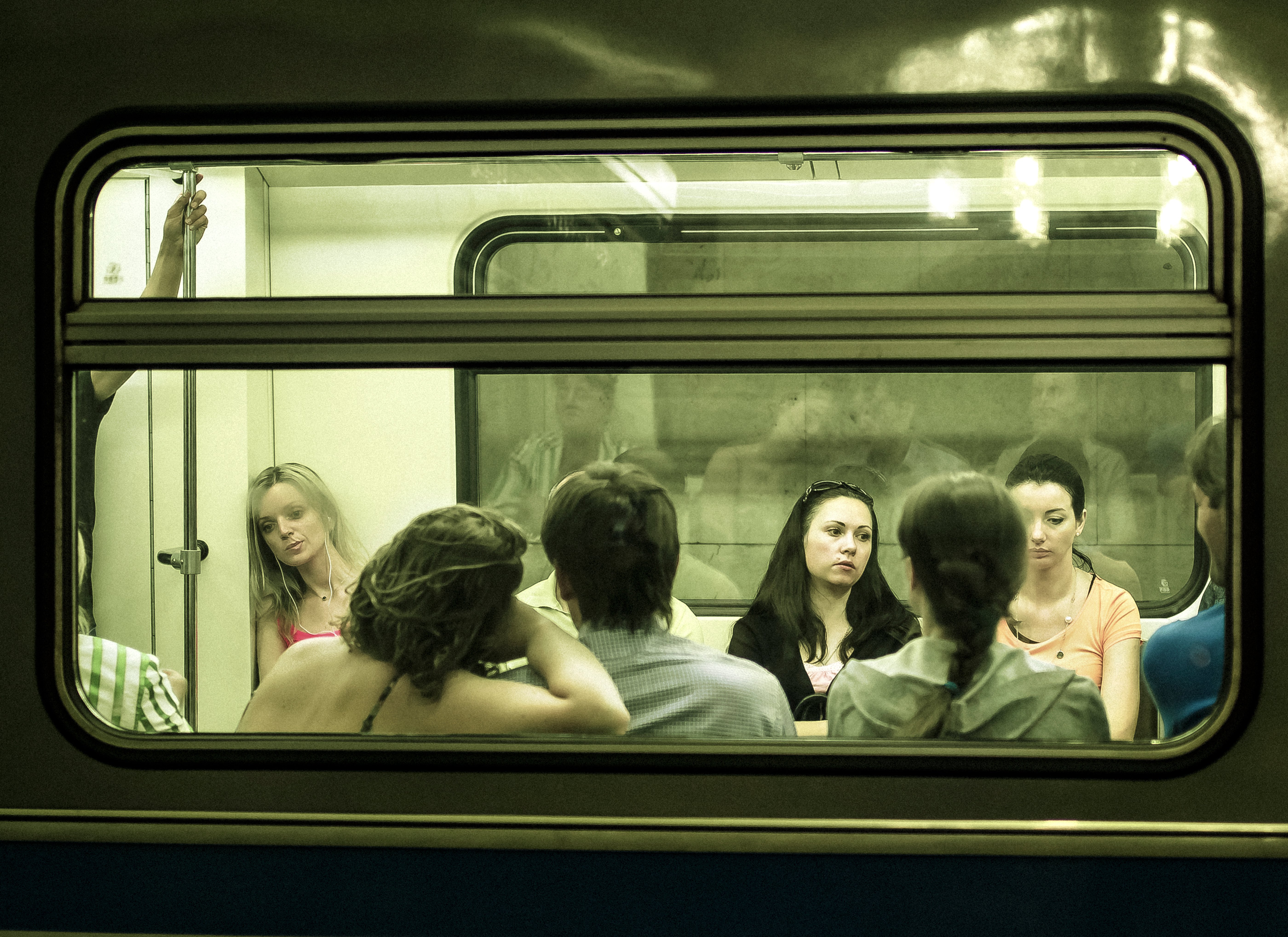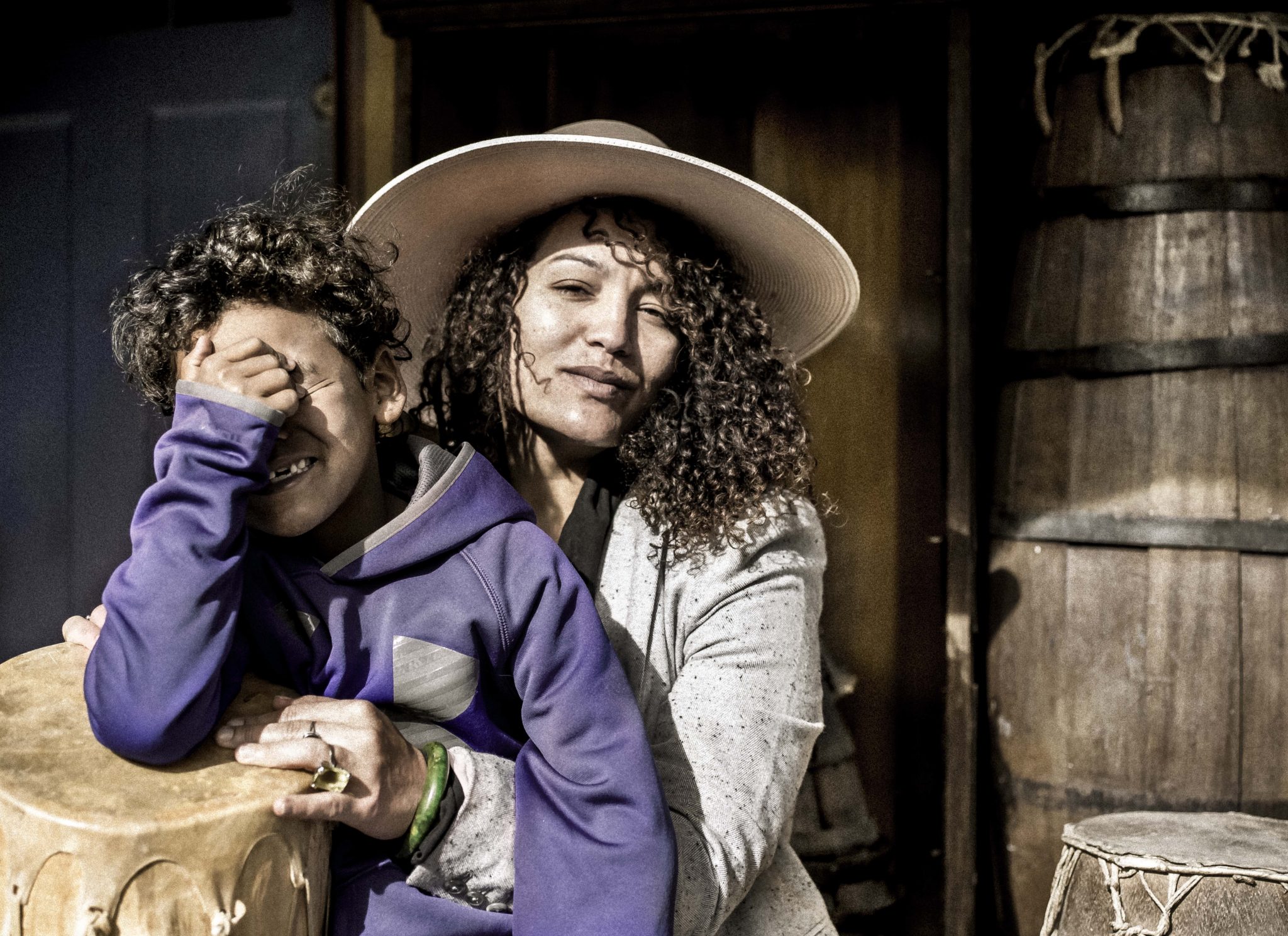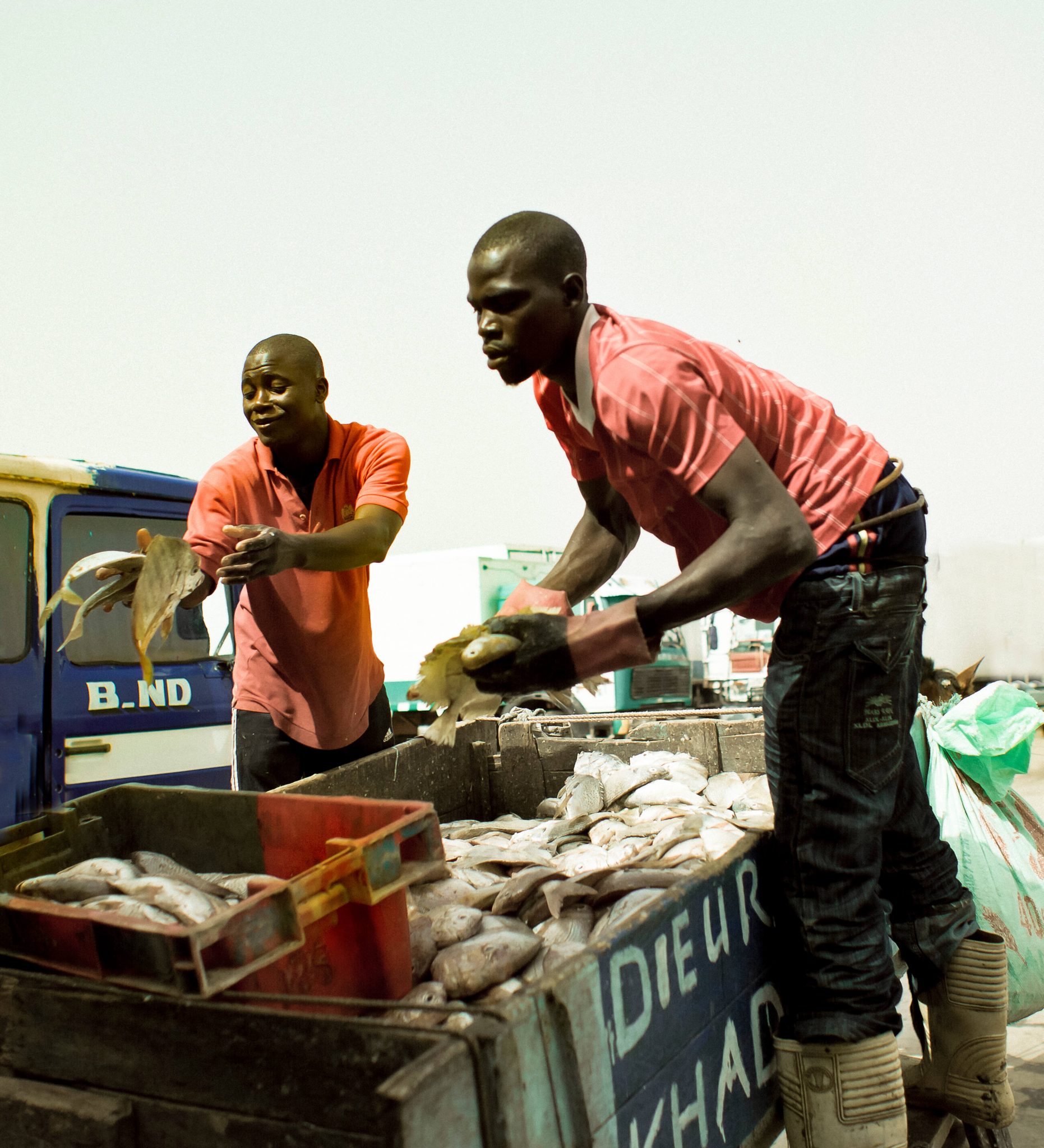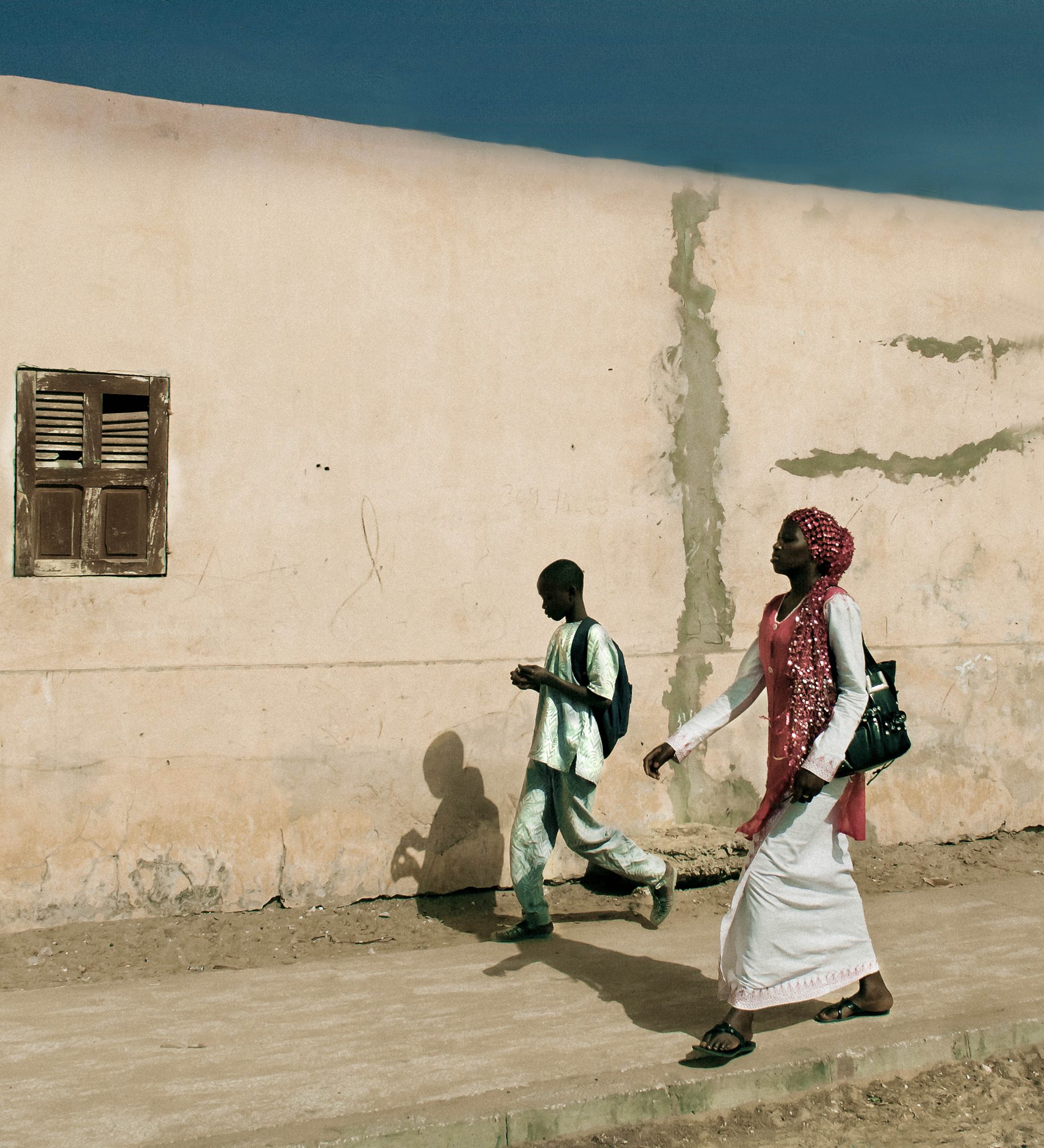
Ch. 3: Ismael and Hamimu – St. Louis
It wasn’t too hot. The temperature on that Friday in St. Louis was agreeable, 22 degrees Celsius, while Lomax and I sat at a table under a big umbrella with remnants of our breakfast. No other foreigners sat at the tables in the courtyard, only two middle-aged African men wearing suits and drinking coffee in a corner. It was 10:34. The blue of the sky toward the west, somewhere above the Atlantic Ocean, was interrupted by a single cumulus patch, which seemed to appear out of nowhere. I became aware of a figure in front of me. Ismael was standing there.
“We wondered when you were going to show. You’re a little late. We can’t go now,” Lomax commented.
We knew we needed a guide for a tour of the traditional fishing community occupying the spit of land, known as La Langue de Barbarie, which faced the Atlantic Ocean to the west and stretched over the border from Mauritania toward the south. The neighborhood called Guet N’Dar and connected to N’Dar Island by a narrow bridge, Pont Moustapha Malick Gaye, was home to a group of people called the Lebou. They supported themselves by fishing in the Atlantic Ocean. But the fishing industry was in steep decline. In a desperate search for other means of survival, growing numbers of fishermen and their families attempted to migrate to Europe. The journey to Spain at the southern tip of Europe was treacherous whether by boat around Morocco and via the Strait of Gibraltar or by jeep through the sands of Mauritania or Libya and then across the Mediterranean in flimsy watercraft. Many started the journey; few finished.
“For a visit to Guet N’Dar,” I said to Ismael, “how much do you charge?”
“15,000,” Ismael answered. “I can take you now.” Converting CFA francs to U.S. dollars, I calculated his fee, $25.
“No, not now,” I replied. “We have to take care of other business first. Meet us in the lobby tomorrow.”
“You don’t need me today?” Ismael said.
“No,” I said. Ismael looked displeased, even angry.
“Are you familiar with Maison d’Hotes au Fil du Fleuve?” I asked, realizing Ismael was desperate for work and also changing the subject to defuse his anger. The name of the hotel where François was staying had suddenly come to me, and I wanted to visit the place sooner than later.
“Yes, the hotel is near the southern tip of N’Dar Island,” Ismael replied, regaining his composure. “The view of the Senegal River as it empties into the Atlantic Ocean is excellent from the top floor of the hotel.”
I stood up. I reached into the pocket on the front of my shirt and removed three 5,000-CFA-franc bills. “Your payment,” I said, placing the money on the table. As soon as I saw the gold rings on Ismael’s hand glinting in the morning light, I wondered if they came from Mali like Sylvie’s bracelet.
“By the way,” Ismael commented, “I know most of the people who work on board the Bou el Mogdad. For example, I know Ansoumana, the chief guide. Also, I know Anta, the masseuse. They can help you with your projects. I can speak with them if you want for a fee.”
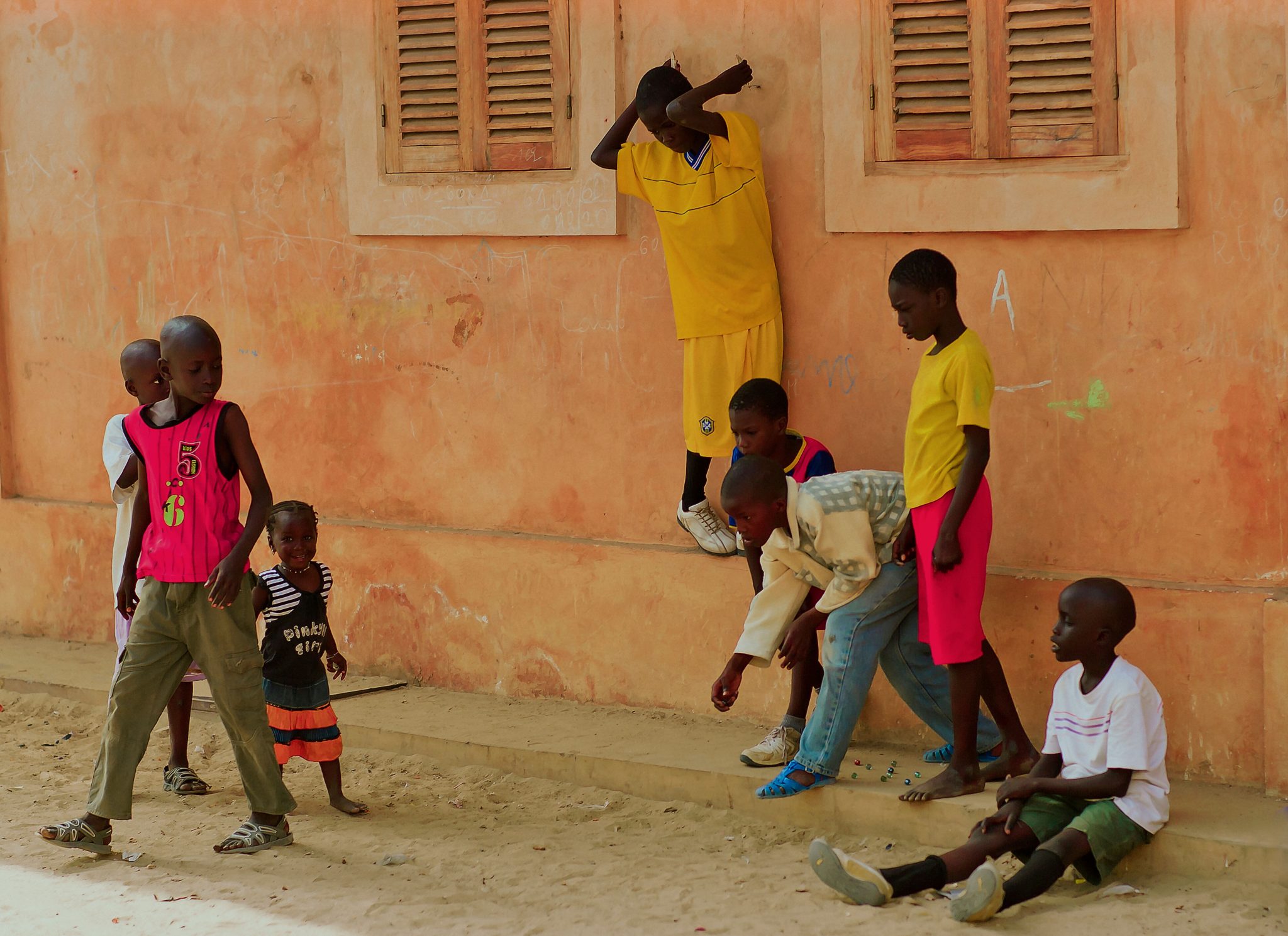
Boys Playing Marbles
Anna, the Italian
Across the street from Hôtel de La Résidence, on the east side of Rue Blaise Diagne, Lomax and I passed through a metal door and entered the offices of the river-boat company, la Compagnie du Fleuve. Sitting behind a desk just inside the door was an attractive woman in her early 30s with an olive complexion, dark hair, and dark eyes smoking a cigarette. When she saw us, she tapped the end of the cigarette on the edge of a small ashtray, flicked away a long ash, and expelled a cloud of smoke. “My name is Anna, and I manage the office here,” she said with an Italian accent.
Lomax replied, “François sent us. He thought you could help us.”
Anna stared at Lomax, a blank expression on her face. It was obvious she had no idea who François was.
Lomax started waving one hand in the air, attempting to dispel the cigarette smoke as he moved backward away from Anna toward the front door. Anna, who was watching closely, put out her cigarette.
Lomax became silent. He stood at a distance from Anna, half of his body inside and half of it outside the door.
“We have reservations on the next cruise, leaving this Sunday,” I said, wondering if Lomax was having a bona fide allergic reaction or putting on an act to embarrass Anna. I stood silently for a little while and then said slowly in Italian, “We would like to switch from a single room without air conditioning to a single room with air conditioning. Please. If you can help us, we would be grateful.”
Anna replied without hesitation in Italian, “No. This is not possible.” She repeated the statement in English. Lomax, who still was coughing, turned around and went completely outside, bumping into an old man on the street only to re-appear in the doorway a moment later.
“Ask her again.” Lomax said to me, now speaking in Spanish. “Why can’t she change the rooms? Ask her again. Be firm.”
Anna appeared astonished and, replying in Spanish to me, said, “I don’t know what I can do.” She paused. “But,” she continued, “I want to help you. Let me think about it for a while. Give me 25 minutes.”
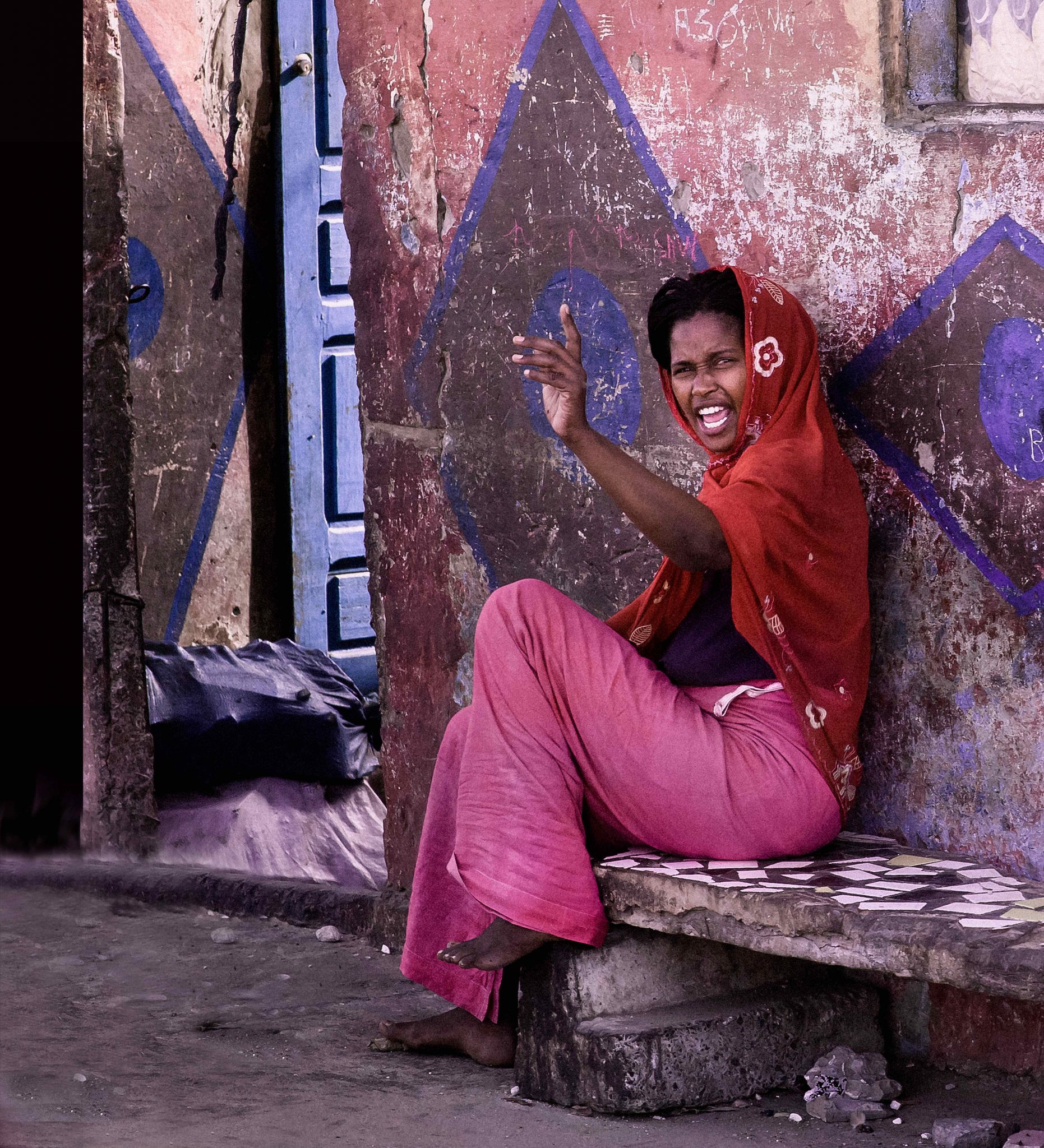
Colorful Woman
“Gracías,” Lomax said.
Looking at me again, Anna switched back to Italian and explained to me that the two Roman couples, who had reservations for two rooms with air conditioning on the forthcoming trip, were supposed to be arriving in Dakar from Rome the next day, a Saturday. “If they don’t arrive here in St. Louis by noon on Sunday,” Anna added, “you can have one of the rooms.” She glanced at an ancient green telephone next to the ashtray on the desk. “I’ll call the travel agency in Rome.” She paused. “Anyway, they still haven’t paid the remainder of their fees. If they don’t pay us, it doesn’t matter when they arrive. They don’t get on the Bou el Mogdad.”
When a moment later the telephone started ringing, Anna glanced at me and picked up the receiver. “Bou el Mogdad,” she said, and after listening for a few moments, she began to speak in Italian once again. After a few minutes, she replaced the receiver. A displeased expression settled over her face. With her mouth a narrow slit, she said, “Va bene. You can have one of the rooms. They don’t pay.”
“Thanks,” Lomax replied.
“The problem solves itself,” Anna commented in Italian.
“Are you from Rome?” I asked in English. Then, not waiting for an answer, I added, “I used to live there in an apartment across the street from Basilica San Paolo.” Anna stared at me. “But it wasn’t easy,” I continued. “My apartment was directly above a bar,” I said, “called Bunny’s Pub Disco.” I paused, studying Anna’s face. “It was very loud,” I smiled, “every night.”
Anna appeared to regain her composure. She said in Italian, “You guess right, although I don’t know how.” She removed a new cigarette from a pack lying on the desk. “My friends and I went to Bunny’s many times. Usually, we were drunk.” A young black man wearing a suit without a tie entered the room through a back door, came to Anna’s side, and whispered in her ear.
“I have to see about some other arrangements,” Anna commented, glancing from me to Lomax and back to me. “Was there anything else?”
“Where can I find an embroidered top and pants like those you’re wearing?” Lomax said, interrupting. “For my girlfriend in California.”
“Next door,” Anna replied, standing up from her chair, pointing with her hand, and starting to move in the direction of the back of the office. “Hamimu has beautiful things.” Then Anna stopped and looked at Lomax. “You can buy me something too,” she said, “because you are very rude. Don’t you know most Italians understand Spanish?”
Lomax smiled. “Sure,” he said, “when we get back to St. Louis, I’ll take you out to dinner and show you a good time.” He paused. “By the way,” Lomax continued, “François said our cruise would be taking us down the river from Podor to St. Louis.” He paused again. “But listen. We understood we would be going up the river, leaving from St. Louis. Why the confusion?”
Anna stared at Lomax. Then she started to walk away. “Who knows?” she answered without looking back. “François was right. Whoever the hell François is.”
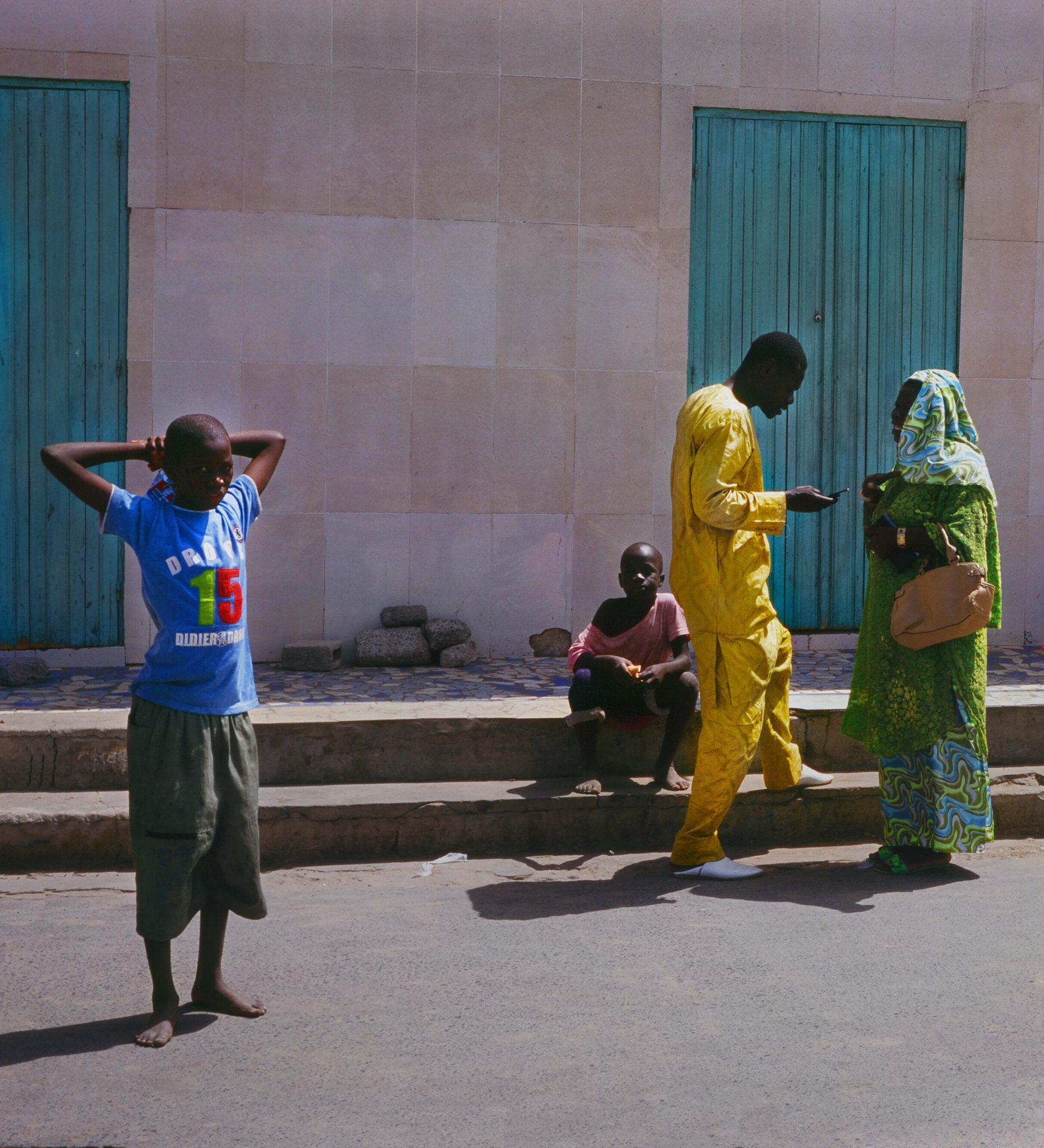
Two Boys, a Man, and a Woman
Hamimu, the Designer
Lomax now appeared to be over his coughing fit. We entered a narrow, rectangular room with a colorful selection of clothes. It was the shop of Hamimu, the place Anna had recommended. Following Lomax into the room, I stopped inside the threshold of an open door and looked at my watch. 11:45. I wondered how hot it would get that afternoon and turned around to face the dusty street for a moment. The heat from the asphalt was intense, but I could feel a slight breeze blowing off the Senegal River a block away. I was aware we were in the desert now and we would stay in the desert for the coming week. The heat, as we traveled inland from the coast, only would continue to rise. The trip on the boat might be a little grim.
In contrast, the interior of the shop was cool and dark. I saw Lomax standing next to a slender man dressed in bright colors, including a blue tie and a red cowboy hat. It became clear the man was gay. The two of them stood in front of a rack of clothing from which tops and bottoms of different sizes were hanging. “I designed and made all of the clothes you see,” the man explained to Lomax. “Ooh, your girlfriend would love this one,” he said, handing a multi-colored pant suit to Lomax. I sat down on a chair near the open front door and scrolled through messages on my phone. I didn’t find the one from Washington, D.C.
“Check out another outfit Hamimu has for Gina,” Lomax shouted to me, referring to his girlfriend in California. I stared. Lomax was showing off a pair of long pants with a matching blouse. They were awful.
“Hi, darling,” Hamimu said, waving at me across the room. The gay man from Senegal swung his hips and winked. He liked me.
My phone, still in my hand, pinged. I looked at the screen and saw a message from Ismael. How did he get my number? I tried to recall giving it to him, but could not. He had information for Lomax and me and would be waiting for us in the lobby of Hôtel de La Résidence at 1:00. Damnit.
“What are you doing here?” a voice said. I looked toward the doorway. Madeline stood just outside in the street smiling. Sylvie stood beside her. They appeared out of breath as if they had been walking fast, exploring, and as if they now needed some place to sit down.
“Oh, not much. Shopping for women’s clothes as we do every Friday,” I replied. I was making a joke, but I felt irritated by Ismael. I stood up. “We’re just leaving,” I added, looking over my shoulder. “Come on, Lomax,” I continued, “Make up your mind. Pay Hamimu.” I paused, looking back at Madeline and Sylvie. “We have to go.”
The women moved toward a clothing display on the right side of the door and began picking through and holding up blouses. “Where are you going?” Madeline asked, looking up from a blue shirt with yellow flowers.
“To the hotel,” I replied. “We’ll eat in the bar. Then, at 1:00, we have a meeting with our guide.” I paused. “He’s out of line,” I went on. “His behavior is annoying.”
“You’re referring to Ismael?” Sylvie asked, holding a green blouse in one hand. “I want to talk with him. He can help us, if he can’t help you.”
Lomax approached carrying a plastic bag in one hand. “Let me see,” Madeline said, grabbing the bag and removing a single pair of women’s slacks. “It’s okay, just okay” she said, dismissively, holding the pair at arm’s length. “But which pair are you going to wear to dinner tonight? This one?” she asked, looking at Lomax. He lit up. Hamimu, watching from across the room, laughed. “I want a suit in this color myself,” Madeline added. Then she couldn’t hold back. “Who are these for?”
At that moment, Hamimu came to the doorway. “Let me help you find what you want,” he said, draping an arm around Madeline’s shoulders and staring at me.
“We’ll be there for lunch,” Madeline said, looking at me over her left shoulder as Hamimu led her away. “It will take us 10 minutes.”
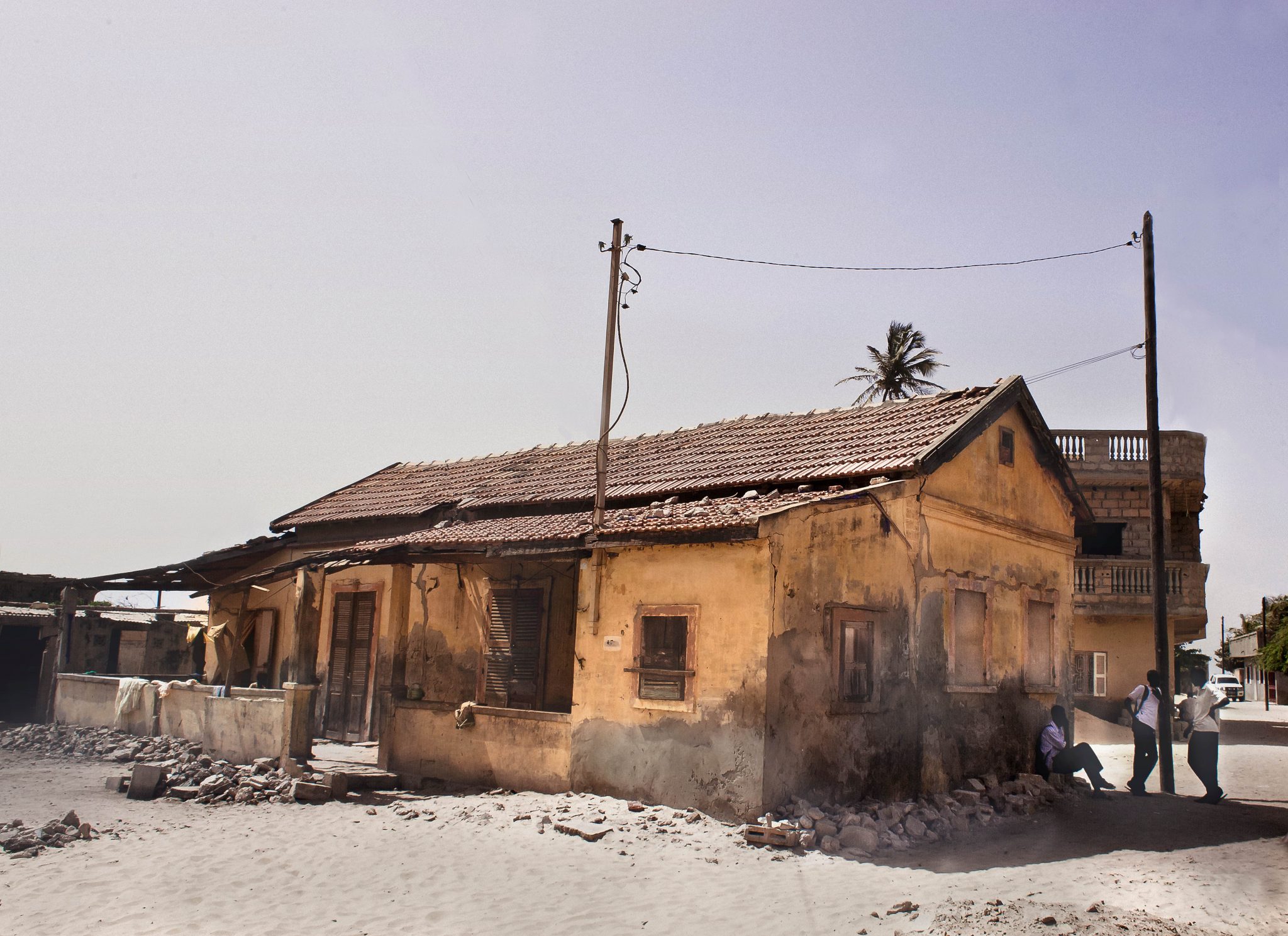
A House on the Beach
Planning a Trip to Mali
At the south end of the main dining room on the ground floor of Hôtel de La Résidence, Lomax and I opened a set of wooden-framed, glass-paneled doors and entered the hotel bar. As we were sitting down at a small table at the back of the room, I saw a message from François and said to Lomax, “François has viewed your work in your on-line gallery and wants to meet and take some photos.” I looked up from the phone. Other than Lomax, I didn’t see anybody else in the room.
“Sounds good,” Lomax replied. “But it’s noon. The sun is directly overhead and too bright. We can’t shoot anything effectively.” Lomax had his rules.
“Good point,” I said, staring at my phone and typing a text message to François. “I told him to meet us in the lobby at 1:00. He can join our meeting with Ismael.” The moment I set the phone back down on the table I received a reply from François, confirming the time.
A short black man wearing a white apron came out from behind the bar to take our order. I hadn’t noticed the barman earlier. Lomax and I asked for the national dish of Senegal known as thieboudienne, a type of ray-finned fish called sardinella accompanied by white rice. Before the barman could reach the glass-paneled doors to make his way with our order to the kitchen, the front doors opened and Madeline and Sylvie entered, each carrying a plastic bag. Glancing at Lomax and me, Madeline spoke in French to the barman, who had stopped in front of her. Then the women walked over and sat down at a small table next to ours.
“We ordered fish with rice also,” Madeline said, looking at her watch. “We should have just enough time to eat before Ismael arrives.”
Lomax looked at Madeline, raising his eyebrows. “You want to accompany us on a tour of the fishing village in Guet N’Dar?” he asked.
“Oh, are you going to Guet N’Dar?” Madeline said. She paused. “No, we can’t.” She glanced across the room at the window with its view of Rue Blaise Diagne. “We’re tired. We’ve been walking all morning.” She looked at Sylvie. “Anyway, we’re hoping Ismael can help us with a problem.”
I knew what she meant, glancing at the thin gold bracelet Sylvie wore. “What makes you think Ismael has any knowledge of jewelry?” I asked.
“The rings he wears,” Sylvie responded, laughing before glancing at Madeline. “We know that his gold he actually mines himself, somewhere in the south not too far away.”
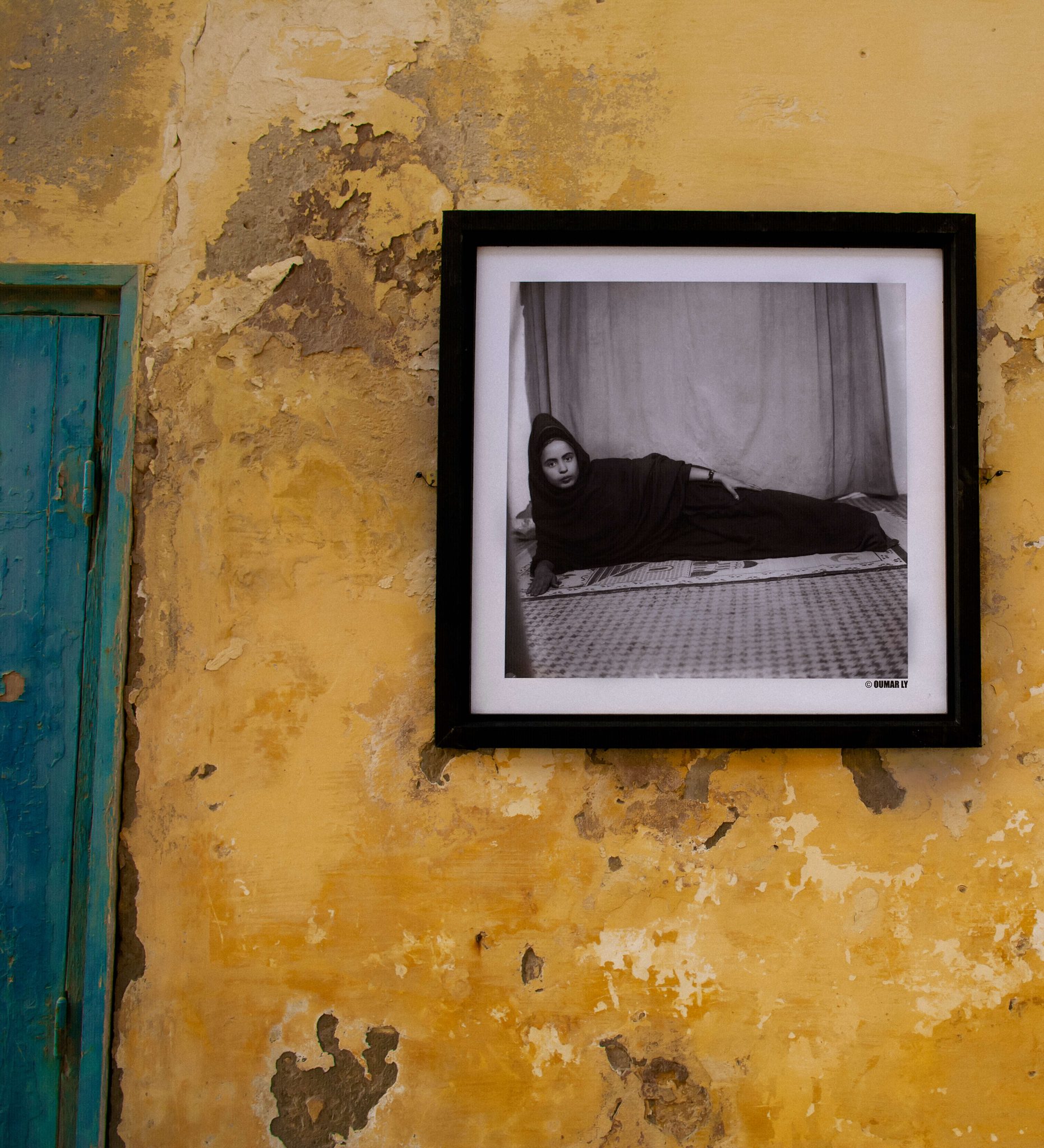
Woman in Photograph
I was about to ask where Sylvie had gotten her information when the barman returned carrying a large circular tray on one hand, just above the right side of his head. The man from the Fulani ethnic group of Senegal placed a dish with fish and rice in front of Lomax and me.
“Who is the woman you’re buying clothes for?” Madeline asked once again.
“What about your experiences in Mali?” I said to Sylvie, ignoring Madeline. “We’re planning a trip to Mali after our trip down the Senegal River. We want to start in Bamako and go up the Niger River.”
While Madeline and Lomax talked between themselves, Sylvie and I discussed the itinerary of their just completed trip. They had gone from Timbuktu in the center of Mali down the Niger River through Djenne before ending up in Bamako, moving in a direction opposite to the one we wanted to take.
At 1:00, the four of us walked into the hotel lobby. François sat in one of the old, fraying chairs. “As I was on my way over here,” he said, “I saw an announcement on the front door of a café saying Oumar Ly will be in St. Louis next week.” He was a Senegalese visual artist whom Lomax wanted to meet. On our first day in St. Louis, Lomax had purchased a book of photographs by Oumar Ly, who had taken most of the photos in Podor, at the northernmost point of Senegal, where he lived.
Out of the corner of my eye, I saw the front door of the hotel open and Ismael step into the lobby.
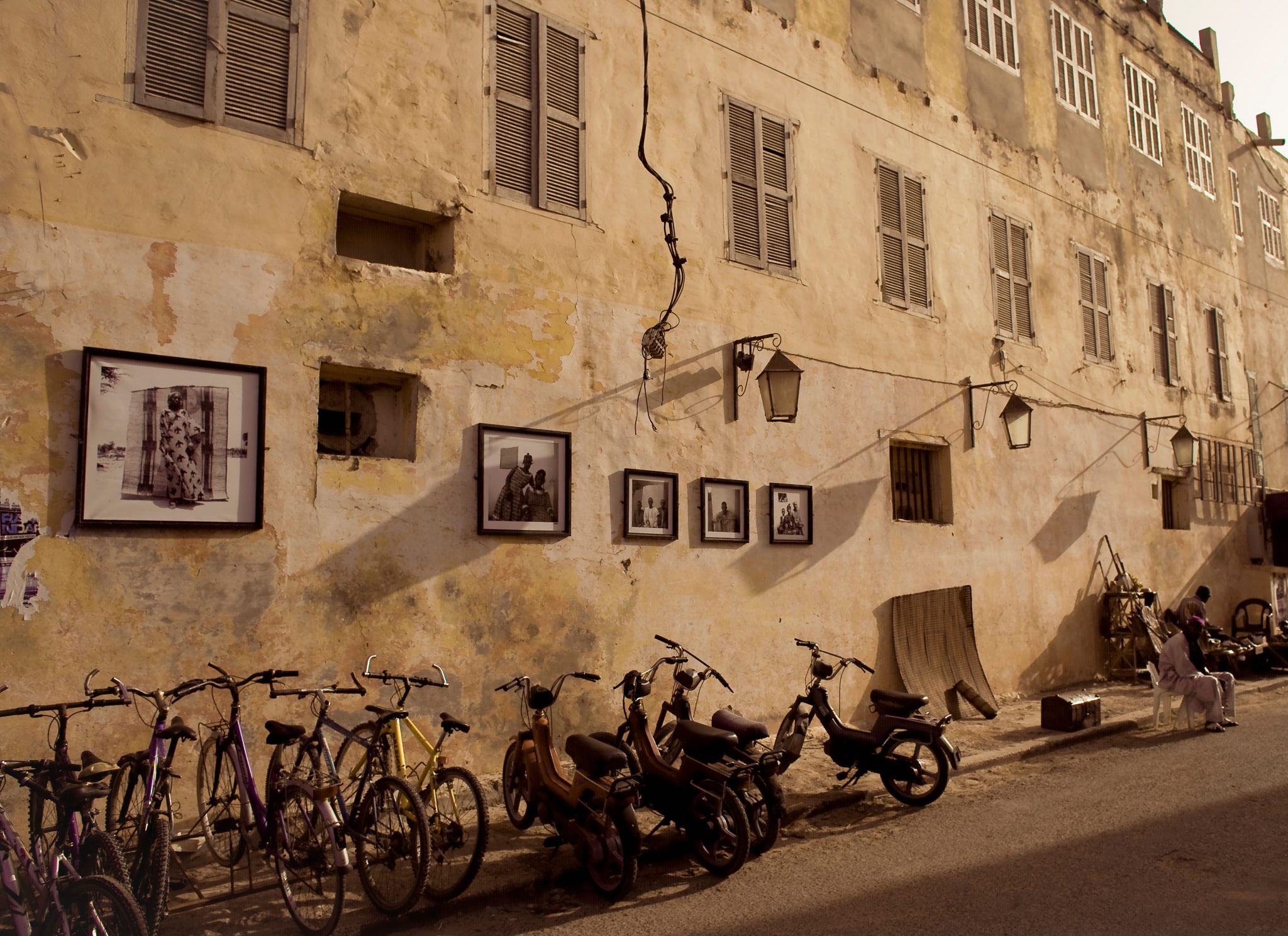
Bicycles and Photographs
Planning Visits to Migrant Camps
At 4:00 in the afternoon, I was asleep on my bed when voices outside the door woke me. Two women were talking to each other in the corridor. I could understand some of their words because French was a language my ex-wife had spoken. I recognized the voices of Madeline and Sylvie. Madeline apparently was asking Sylvie where she wanted to eat dinner that night.
A few minutes later, when I entered the bar, Ismael, Lomax, and François were sitting at a table next to the window. Three bottles of beer rested on the table in front of them. I sat down at an adjacent table since I didn’t see a fourth chair at the table where the others sat. “Ismael says he can introduce us to a man who studies the lives of West African migrants,” Lomax said. “He’s a professor at a university in Dakar, a serious scholar.” Lomax turned to Ismael. “What did you say his name was?”
“Karim Wade,” Ismael replied. “Tonight, I introduce you.”
Lomax finished his beer. “I don’t think I can go tonight,” he said. “I have a large number of images from Dakar I need to download to my computer.” He gestured to the man standing behind the bar. “Then I have to start processing the images in Photoshop, a time-consuming job.” He paused. “If it turns out Karim can arrange visits for us to some migrant camps in Mali and Burkina Faso, I’ll meet with him when we return from Podor on the boat.”
The barman came over. Lomax glanced at me. I nodded. Ismael hurriedly raised his bottle, catching Lomax’s attention. “Three more Flag beers,” Lomax said to the barman, ignoring François who had consumed nothing of his beer.
“I’ll go to meet Karim Wade tonight,” I said.
“I can’t go with you tonight,” François countered. “I have another meeting.” Then he put his bottle of beer to his lips and attempted to drink all of its contents in one long pull. But, he started choking. Lomax and I stared at him. Ismael quietly drank the rest of his beer, holding the bottle to his lips with one hand while with his other hand patting François on the back. Noticing the barman setting down three new bottles of beer, Ismael quickly placed his empty bottle on the table and picked up a full one. I watched Ismael, feeling my irritation rise.
“What time do you want to go tonight?” I said, picking up a full bottle too. Ismael was aware I was watching him, but he didn’t care. He finished his new beer almost instantly. I became even more annoyed.
“7:00,” Ismael answered. “I meet you in the lobby.” Ismael stood up, moved toward the door to the street, and disappeared. He didn’t seem unsteady in the least.
“How did it go today?” I asked, turning my attention to Lomax and François. Neither one of them replied. Lomax looked like he was about to go to sleep. François appeared to be thinking about something else entirely. “What are your impressions of Ismael?” I asked, looking at François.
François shrugged. “He’s an African,” he said, “doing whatever he can to stay alive, hustling. I have to go. Let me know if you need anything.”
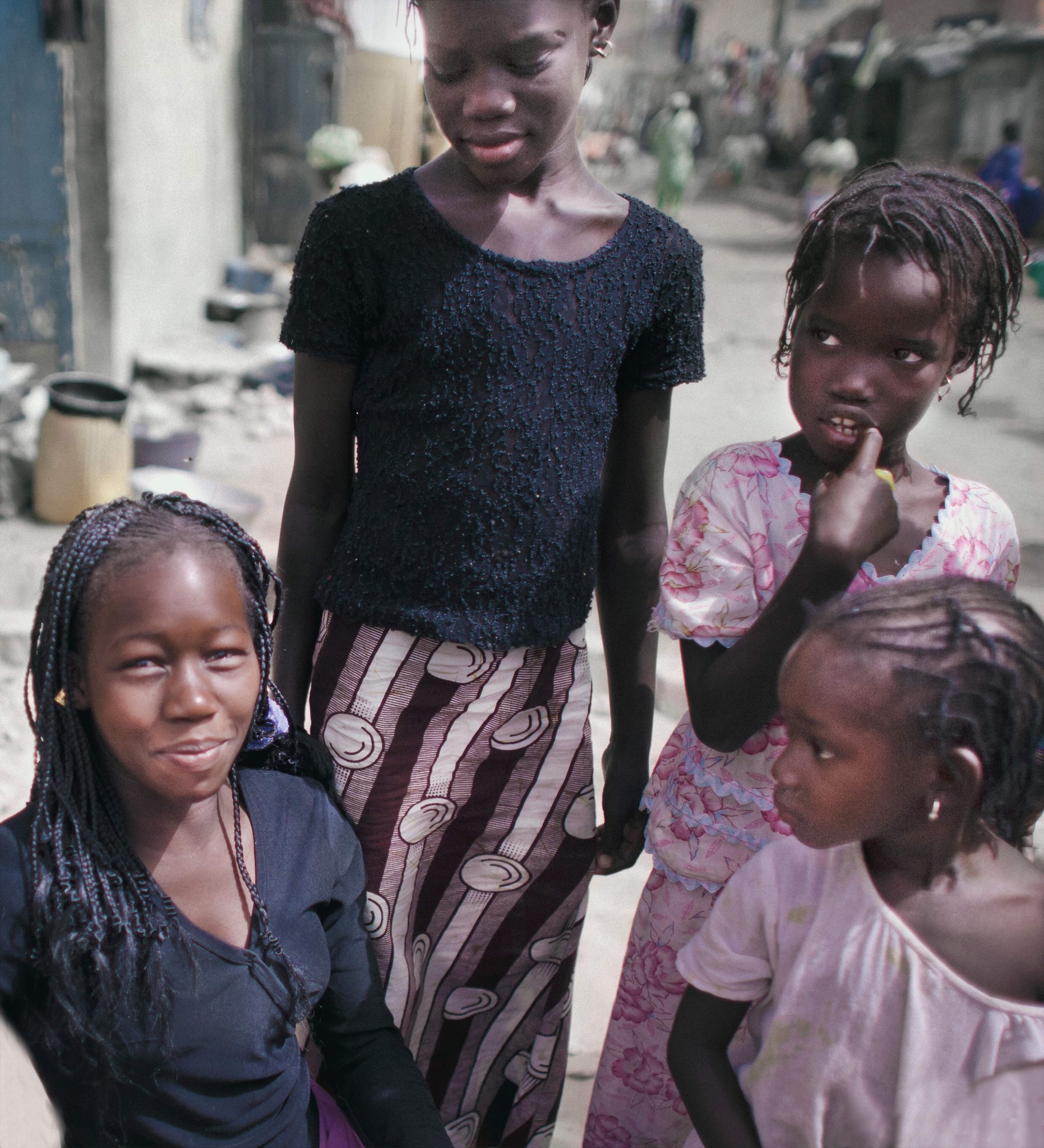
Young Woman with Three Girls
Flamingo Restaurant, Karim Wade
After exiting Hôtel de La Résidence, Ismael and I walked south on Rue Blaise Diagne a short distance and then turned left on Rue Blanchot. We walked another 250 feet to Quai Roume, stretching along the banks of the Senegal River. It was almost 7:15pm. The sun, now completing its descent in the sky over the Atlantic Ocean less than a mile to the west, cast shadows over the streets of N’Dar. I saw no sign of the men who had been following Lomax and me through the streets.
When Ismael and I turned right on Quai Roume, we walked another 50 feet in a southerly direction toward Pont Faidherbe. Ismael came to a stop in front of an open iron door in a hedge extending along the road. The waters of the river were 30 feet away. They looked motionless, but they were not.
I stopped next to Ismael, realizing Quai Roume was completely deserted. Above the doorway was a large piece of sheet metal displaying a single word, Restaurant. In addition, two other metal signs, one on each side of the doorway, displayed the same words, Flamingo Restaurant.
Ismael’s skin assumed a gold tint in the rays of the setting sun. He broke his silence, saying, “We meet Karim here,” and we passed through the doorway carved out of the hedge, emerging into a compound. In the middle of a grassy area lay a pool of blue water. Around the pool were wrought-iron tables and chairs arranged in groups. An iron railing just beyond the tables on the opposite side of the pool marked the far edge of the property. Beyond the railing was the river, its darker waters catching here and there in the fading evening light.
Ismael and I walked toward a low building containing a kitchen. I could see a bar extending the length of a wall. Rows of bottles were visible on a series of shelves behind the wooden bar.
As Ismael lowered himself into a heavy metal chair at one of the tables, he waved to an African man at the bar; I sat down in another metal chair facing the pool. The barman brought two bottles of beer and placed them on the table, tilting it slightly to one side because either one of its legs was short or the grey flagstones were uneven.
Ismael took a swallow of beer while I admired the well-kept grounds. I imagined how appealing the setting would be to a tourist looking for a place to escape the heat and enjoy the pool.
Tensions, though, were rising steadily in the region. In the past, Senegal had enjoyed relative stability compared with its neighbors. But because of a decline in the country’s food production, including both the agricultural and fishing sectors, one based in Casamance and the other in St. Louis, more people went hungry. In St. Louis, despair among fishermen was evident. In Dakar, refugees fleeing war and famine from adjacent countries poured into broken-down neighborhoods. As migrants roamed the streets, Europeans and North Americans stayed away.
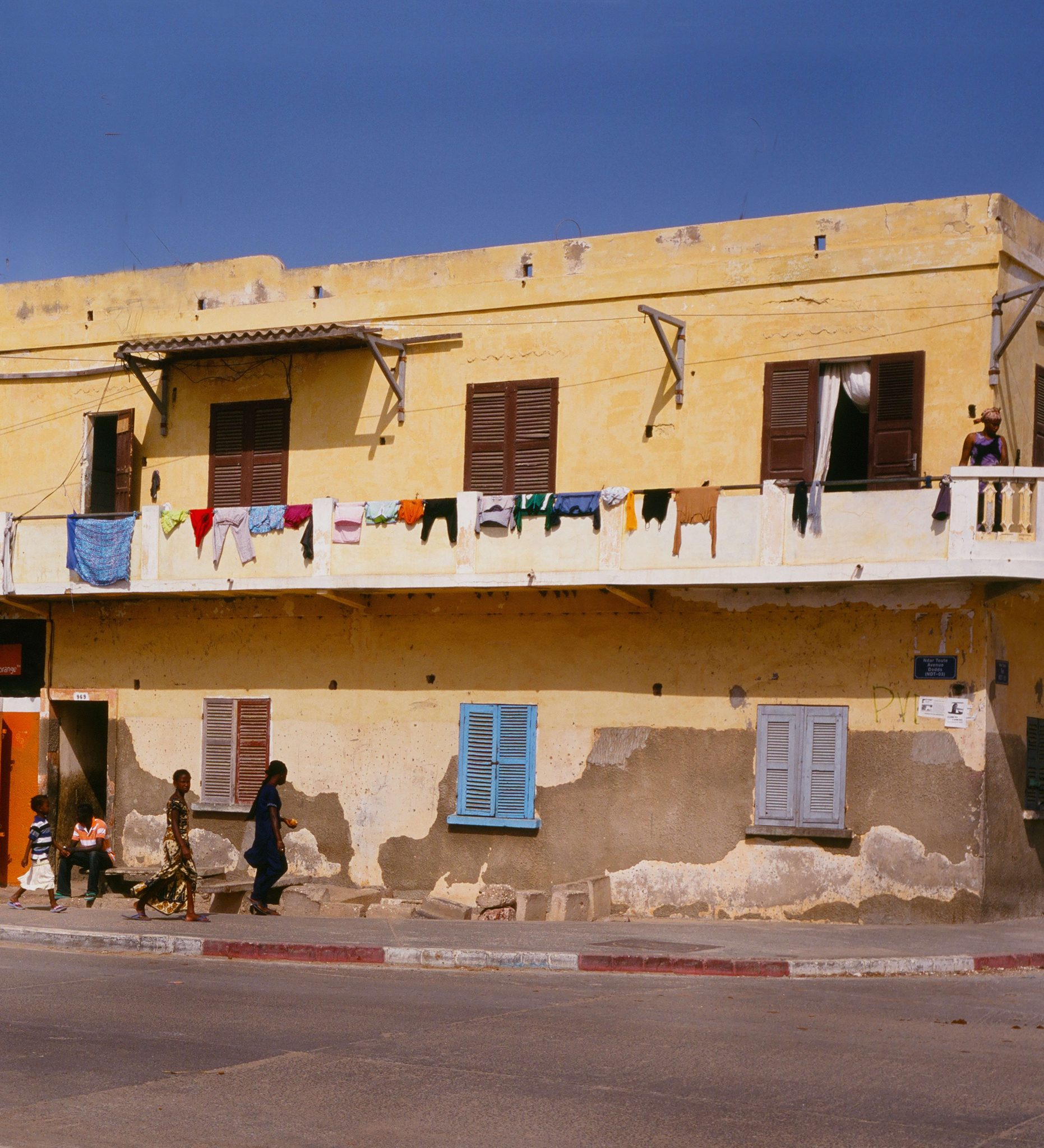
Clothes Hanging from a Balcony
“Deposits of gold have been discovered in the southeast along our border with Mali,” Ismael revealed, seeming to read my thoughts. “They provide hope,” he added. “I have a claim on a mid-sized plot in Diabougou,” he said, “with two partners.” He shifted in his wrought-iron chair. “We plan to start up our operations again soon. They are shut down right now.” I glanced at Ismael’s jewelry, but, at the same time, I also started having more doubts about his intentions.
A figure emerged suddenly from the hedge, entering the compound through the gate which Ismael and I had used. He was bulky, wearing a dark-blue suit jacket over a pair of white trousers. His appearance suggested someone overly fastidious and eager to stand out.
“I’m Karim Wade,” the figure announced. I stood up from the table, shook his hand, and introduced myself. In the presence of Karim, Ismael seemed to become deferential. The barman, too, reacted, bringing out a small tray with three more bottles of beer and some slices of pineapple on a plate. As soon as the barman placed the bottles on the table, Ismael began drinking compulsively.
“I can’t stay long,” Karim declared, sitting down. His English was good, but it also revealed the typical lilt of a native French speaker. Karim continued, “I have to go back to Dakar this evening and present a paper.” He took a sip of beer, grimaced, and looked at the label. I grinned and suppressed the grin. While Ismael had been drinking as many beers as he could get his hands on, Karim couldn’t even drink one.
“I’m a lecturer in political science at the Université Cheikh Anta Diop, specializing in human geography,” Karim explained, launching into a discussion of the economic and political forces at work in West Africa. “I study migration patterns,” Karim added, “making recommendations for policy changes to address strategic issues.”
I had heard similar words before.
While Karim expertly recited facts and figures, I already was aware of them and, very soon, stopped listening. The mobile phone lying on the table in front of Ismael, I noticed, vibrated off and on. Each time Ismael picked up the phone and glanced at it before putting it down again.
Karim finished talking, took a sip of beer again, and seemed to find the liquid still distasteful.
“Would you be interested in seeing the migration routes people are taking from Timbuktu in Mali to the U.N. camps in Burkina Faso?” Karim asked, then stood up. “I’m going to Timbuktu sometime in the next two weeks,” he continued. “You could go with me.” I noticed that his suit jacket and his white linen trousers were made from very expensive materials. They were immaculate and showed no wrinkles, in contrast to Ismael’s polo shirt and jeans. “Let me know,” Karim said, handing me a card with his name and number printed on it. He shook my hand. “I assume you will write about these issues when you leave Senegal and return to Washington, D.C.”
Karim turned and disappeared through the hedge onto Quai Roume.
I sat down again, staring into the night. I still didn’t see anyone on the restaurant grounds. On the river beyond, no boats were visible in the encroaching night. From a stereo speaker somewhere behind me, music came out and seemed to float in the air. I recognized the group and the singer. “Baaba Maal,” I remarked. I raised my head and turned in the direction of a speaker mounted on a beam on the patio’s roof. Baaba Maal, who came from Podor, was one of Africa’s most popular musicians, touring constantly across Europe and Africa.
“Baaba Maal is in St. Louis now,” Ismael replied. “He just returned from Germany. You might see him tonight. I saw him last night. He was good.”
I looked at my watch. 8:47. Ismael’s phone was flashing.
Ismael picked it up and talked for a few moments in Wolof. Then he closed the phone, put it into a pocket on the front of his shirt, and drained his beer. He turned to me, but said nothing. He gestured to the barman.
“Pay the man,” Ismael instructed.
**
